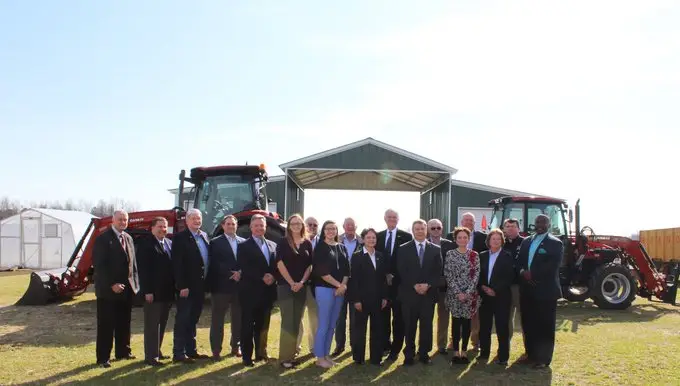The work of the Golden LEAF Foundation has brought resources and creative solutions to rural, tobacco-dependent and economically distressed communities in North Carolina for more than 20 years. With a mission rooted in long-term economic advancement, the Foundation has awarded a combined 1,882 projects across the state since 1999. Projects totaling more than $1 billion have helped create more than 65,000 jobs, support almost $700 million in new payroll and help train more than 85,000 workers. Earlier this month, the Foundation submitted their annual report to the N.C. General Assembly as required by law.
“The Golden LEAF Foundation Board and staff work every day to evaluate and fund job creation initiatives to increase economic opportunity in North Carolina’s rural and tobacco-dependent communities,” said Bo Biggs, Golden LEAF Board Chair. “We are proud to invest in projects to implement strategies that move the economic needle and the annual report reflects that success. Last year, Golden LEAF awarded more than $48 million to support 134 projects in the areas of economic investment and job creation, workforce preparedness and education, agriculture, community vitality, and disaster recovery. The Foundation also responded quickly to provide $15 million in initial funding for a loan program to support small businesses affected by the COVID-19 pandemic.”
Through targeted efforts, like the Economic Catalyst Program, the Foundation has helped land major economic development projects. In Fiscal Year 2020, Golden LEAF awarded $5.9 million to help eight projects create an additional 1,592 jobs with a capital investment of more than $360 million over the next few years.
One Economic Catalyst award helped fund constructing an access road at an industrial park in Wayne County. The $300,000 project led to the Atlantic Casualty Insurance Company expanding its facility by 30,000 square feet with the plan to add 83 jobs. Without that access road, the company was considering expanding in Virginia, Ohio, and Arizona.
In addition to supporting economic development through expansion projects, the Foundation also heavily invests in worker training efforts and programs that help North Carolina’s current and future workforce.
It is estimated that by 2030, 67% of jobs will require a post-secondary degree or credential. On its current trajectory, post-secondary educational attainment will only reach 54% in North Carolina. To help close that skills gap, Golden LEAF focuses on workforce programs that increase the pool of highly qualified individuals with skills aligned to North Carolina employers’ current and future needs.
In April 2020, Johnston Community College Foundation received $185,994 through the Golden LEAF’s Open Grants Program to become a Certified Education Center through the Fabricators and Manufacturers’ Association. Through this new fabrication program, the college will provide specialized training and an enhanced curriculum in welding as well as a stand-alone certificate option and third-party certifications.
To complement ongoing workforce development efforts, the Golden LEAF Opportunities for Work (GLOW) special initiative was launched in January 2020 – when unemployment was low and North Carolina was experiencing significant job growth. Although the COVID-19 pandemic has drastically changed the economic outlook in the state, employers still have a significant need to educate and train a qualified workforce. In June 2020, the Foundation awarded 10 projects totaling $3.49 million through the GLOW initiative.
With a $365,000 GLOW award, the Asheville Area Chamber of Commerce Community Betterment Foundation built a consortium of partner organizations to better support and serve adults with significant employment barriers. The project helps link this population to employers with high-demand jobs in construction, manufacturing, and health services.
The Foundation also supports tomorrow’s workforce through the Golden LEAF Scholarship Program. Since 2000, Golden LEAF has awarded $63 million in scholarships to enable more than 22,855 students from rural counties to attend two-year and four-year colleges and universities in North Carolina. Scholarships target students who (1) reside in rural N.C. counties that are tobacco-dependent and/or designated economically distressed, (2) demonstrate financial need, and (3) show an interest in staying in a rural N.C. county after graduation. Recipients may attend a participating N.C. college or university of their choice.
In recent years, Golden LEAF has managed state emergency funding to aid communities recovering from major storms. Following Hurricane Matthew, Hurricane Florence, and Hurricane Dorian, state legislators appropriated a total of $114.5 million to the Golden LEAF Foundation for recovery efforts. The aid helped repair or replace equipment and infrastructure damaged or destroyed by these storms, as well as providing loans for small business recovery. All of the funding has been awarded to support 215 projects.
When the COVID-19 pandemic brought the state’s economy to a standstill, Golden LEAF was there to support local businesses with an innovative rapid loan program. The N.C. COVID-19 Rapid Recovery Loan Program launched on March 24, 2020 with an initial allocation of $15 million to support small businesses and farms. The program, modeled after similar programs funded by Golden LEAF following major hurricanes, offers loans to businesses with low interest and deferred payments. Available funding for the program was expanded by an N.C. General Assembly appropriation of CARES Act funds to Golden LEAF.
To continue to build upon Golden LEAF’s strong track record of supporting long-term economic advancement, the Foundation is engaging in a strategic planning process, including review and evaluation of existing programs. Golden LEAF President Scott Hamilton said the strategic plan will help the Foundation to be more impactful, effective, and efficient.
“Golden LEAF is intentional in its vision for growth and prosperity across all of North Carolina,” said Hamilton. “The Foundation works to help create new jobs in rural areas, get people to work in available jobs, and prepare communities for recovery from natural disasters. We look forward to continuing to support economic prosperity for years to come.”

